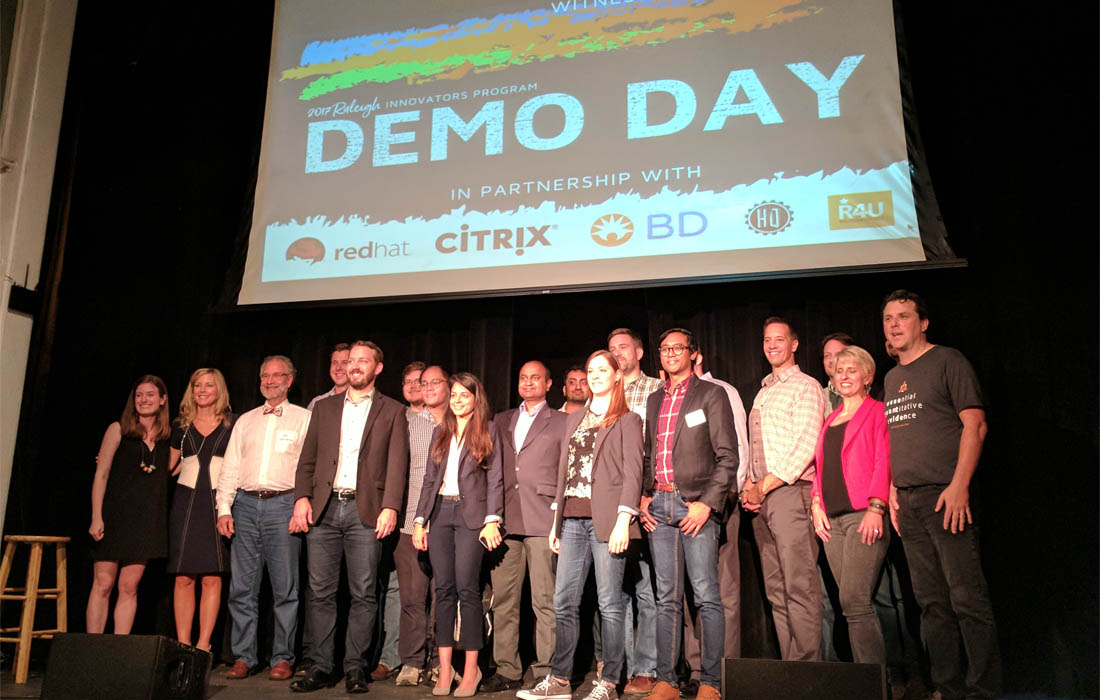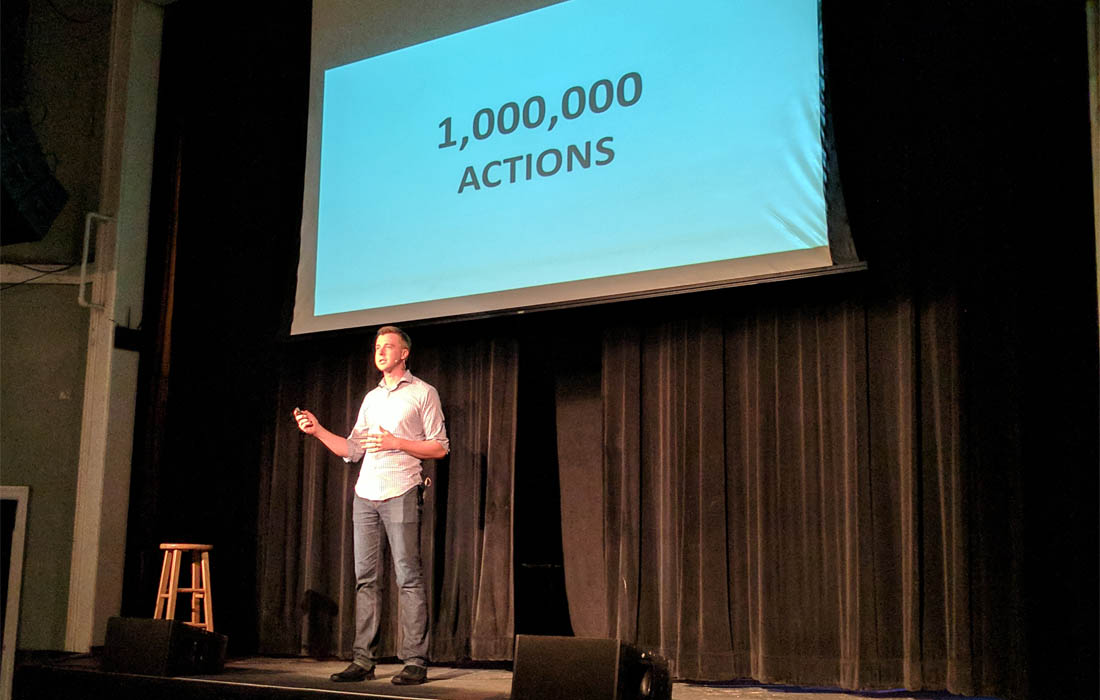The anticipation was palpable throughout the Lincoln Theater as Liz Tracy, director at HQ Raleigh and lead facilitator of the Innovators Program, stepped out onto the stage to kick off the Innovators Program’s fourth annual Demo Day.
“We live in a region that is a top area for entrepreneurship,” Tracy said.
Though startups and small businesses may not have been in the spotlight 10 years ago as Innovators Program cofounder Mary-Ann Baldwin pointed out, the Triangle has built quite a reputation for itself. Raleigh has landed in the top spot on lists like Glassdoor’s Best City for Jobs, Selfstorage.com’s Hot Spot for Tech Startups Outside Silicon Valley and the Financial Times’ Mid-Sized American City of the Future. Not to mention, Raleigh was number four on CNN Money’s Best City to Launch a Startup list in 2014.
The Innovators Program is a three-month long accelerator program that provides $20,000 in funding along with education and mentorship to aspiring startups and internal teams from companies like Citrix, Red Hat and this year Becton Dickinson Technologies. The goal is to take an idea and morph it into a sustainable business model by collecting feedback from potential customers and then testing strategies for scaling to find product-market fit. Whether an internal team or a growing startup, all come together under the program to solve a problem.
This program boasts graduates that have raised a combined $8 million after leaving the program. Health-tech startup Medicom Technologies eclipsed $5 million in private equity funding this year, two years after completing the program. EmployUs, another 2015 graduate, raised $750,000 and is providing its employee referral software to over 100 companies across 15 countries.
The problems this year’s cohort aimed to solve revolved around office management, healthcare technology and activism. Here’s a bit more detail they shared with the crowd of startup enthusiasts and investors in Raleigh.

The fourth Demo Day was held in Downtown Raleigh’s Lincoln Theater. | Credit: Kirsten Barber/ ExitEvent
Below are the details of the 2017 Innovators Program Class:
Citrix Internal Teams
Three teams from Citrix joined the program this year, each dedicated to finding a better way for employees to organize, secure and measure data within their files.
Lauren Prichett, member of the ShareFile Voice team, claimed that the program was a bootcamp for her business brain. Originally in marketing, Prichett got an opportunity that she may not have otherwise had to explore product development with her fellow team members.
“I’m very grateful for the opportunity Citrix gave my partner Chris Tonog and me to become ‘intrapreneurs,’” says Prichett. “No matter where ShareFile Voice goes next, one thing is for sure – the Innovators Program made a lasting impression on my career.”
ShareFile Voice is an office management tool that will integrate Amazon Alexa technology with the Citrix ShareFile system. This device partnership will allow IT professionals to save time by allowing easy data compilation with voice control.
SmartFile allows users to easily generate and automate data quickly into dashboards and reports—work that can take hours of labor without assistance. The solution imports data from multiple sources and pulls the data in a way that makes it easy for the user to display.
The Office Manager app team tackled the challenges and security risks associated with storing files. Human error is one of the most common sources of data breaches, which can cost millions of dollars if not discovered in a timely manner.
With the app, users can easily sort and save their sensitive documents in places like Box or Google Drive with confidence, knowing that the app will help them retrieve the correct file when it comes time to share information internally or externally.
Becton Dickinson Technologies Internal Team
The Becton Dickinson Technologies’ team, Cura, was one of two health-focused teams in this year’s cohort. Cura’s goal is to make it easier for the 40 million Americans taking five or more medications a day to manage their health by reducing confusion and life threatening errors when filling pill boxes.
With $5,000 in promised revenue from potential buyers, Cura is leaving the Innovators Program with a developed product ready for beta testers. The smart, connected pill box will come with mobile connectivity options for patient and caregiver management. Pre-orders are starting at $39.99 per month for the service.
External Startup Teams

Founder of Civicrise, Tim Scales, shares the company’s goals as they graduate from the Innovators Program. | Credit: Kirsten Barber/ ExitEvent
Health-tech startup VitalFlo, Inc., which has brought in a total of $200,000 of prize money in the last three years from competitions like the Lulu eGames, NC Idea and The Big Launch Challenge, is on a mission to improve the lives of the millions of people living with asthma. Its respiratory monitoring system is promised to be a much needed update to existing devices on the market.
VitalFlo’s system allows healthcare providers to collect respiratory data from their patients from the mobile device in real time and catch health risks before a patient reaches critical condition.
As the team moves toward beta testing, VitalFlo already has five pilot commitments, one of them from UNC Healthcare.
Allstacks, another NC Idea grant winner, launched its beta product in June right before starting the Innovators Program. The goal of Allstacks is to make managing teams easier by connecting tools like Dropbox, GitHub, Trello and Salesforce to one email address and password in a safe environment. It eliminates the need for multiple administrative access accounts and makes it easier for companies to turn off and on access for new and former employees.
Allstacks has activated nine customer accounts since June, with the prospect of a 10th this month.
The newest startup of the graduating class was Civicrise, which founder Tim Scales calls a FitBit of civic engagement. The app offers advocacy groups a platform to rally supporters and connect with their audience where email and social media efforts may fall short. The apps sends timely action alerts to supporters that will not only act as a reminder for activists, but as a way to boost the morale of an organization in certain areas. Actions include reminders for users to call their senators, volunteer or attend a rally.
“We’re excited to be graduating the program,” Scales says. “We’ve spent the last three months building a strong foundation for ourselves. We have a lot of questions, and we look forward to facing them.”




























